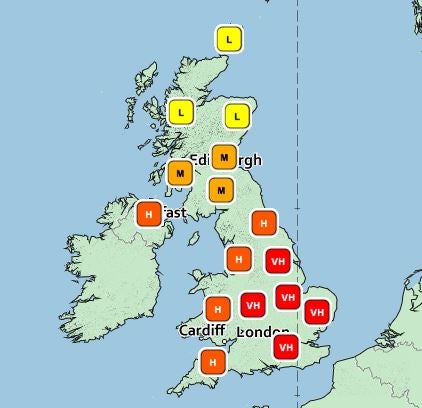Pollen count set to reach 12-year high: Here's how to deal with hay fever
Bad news for hay fever sufferers

Your support helps us to tell the story
From reproductive rights to climate change to Big Tech, The Independent is on the ground when the story is developing. Whether it's investigating the financials of Elon Musk's pro-Trump PAC or producing our latest documentary, 'The A Word', which shines a light on the American women fighting for reproductive rights, we know how important it is to parse out the facts from the messaging.
At such a critical moment in US history, we need reporters on the ground. Your donation allows us to keep sending journalists to speak to both sides of the story.
The Independent is trusted by Americans across the entire political spectrum. And unlike many other quality news outlets, we choose not to lock Americans out of our reporting and analysis with paywalls. We believe quality journalism should be available to everyone, paid for by those who can afford it.
Your support makes all the difference.Pollen levels are set to reach a 12-year high this week, according to the Met Office.
The unusually high pollen count has not reached this level since 2006.
Southern, eastern England and the Midlands are currently on red “very high” alert, while the levels are lower in the rest of the UK.

One in five people in the UK suffers from hay fever, 95 per cent of whom are affected by grass pollen. The pollen season is divided into three main phases:
- Tree pollen: late March to mid-May
- Grass pollen: mid-May to July
- Weed pollen: end of June to September.
The start of the grass season and the prevailing dry, warm, windy weather are to blame for the worsening conditions.
Met Office spokesperson Nicola Maxey said: "As I understand it the reason we have such high pollen levels this year is because we have had perfect weather for pollen so far this year.
"It's been lovely and warm, followed by rain, and then dry days with breezes that lift the pollen off the grass, plants and trees.
"So far this year we haven't seen pollen counts exceeding those of some previous severe years, such as 2005 and 2006.
"It is unlikely that this will be a record-breaking year, although it is more severe than average and the worst in over a decade."
Unfortunately for hay fever sufferers, this may mean itchy eyes, sniffly noses and scratchy throats for a few weeks.
How to cope with hay fever and reduce symptoms:
The Met Office advises that alcohol worsens hay fever, so as much as you may want a chilled beer, G&T or glass of rosé on a balmy evening, it might be best to stick to something soft - alcohol contains histamine which sets off allergy symptoms in the body.
The NHS also recommends putting Vaseline around your nostrils to trap pollen, wearing wraparound sunglasses to stop pollen getting into your eyes and staying inside when you can - try and avoid grassy areas in particular.
Showering and washing your hair at the end of the day and changing your clothing as soon as you get home can make a difference too, as pollen attaches to your hair and clothes during the day. Avoid drying your laundry outside too.
If travelling by car, keep the windows closed. Unfortunately having the air conditioning on can blast pollen inside too - to combat this, invest in pollen filters for the air vents and change them every time you stop the car.
Keeping on top of your hay fever medicine is also essential.
"For help in managing your symptoms, you should seek advice from your local pharmacist, who can suggest the best treatments, like antihistamine drops, tablets or nasal sprays," said Caroline Gamlin, from NHS England.
Join our commenting forum
Join thought-provoking conversations, follow other Independent readers and see their replies
Comments